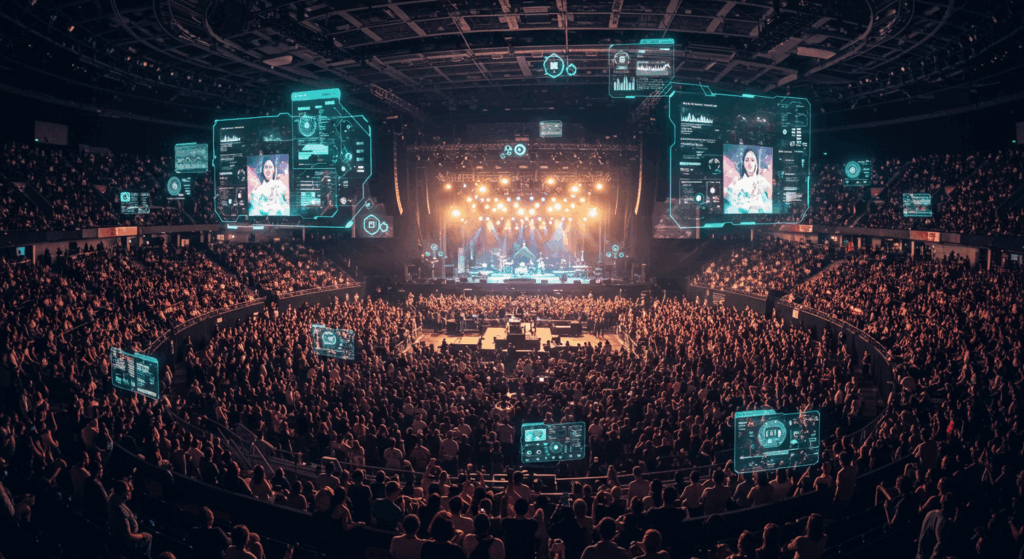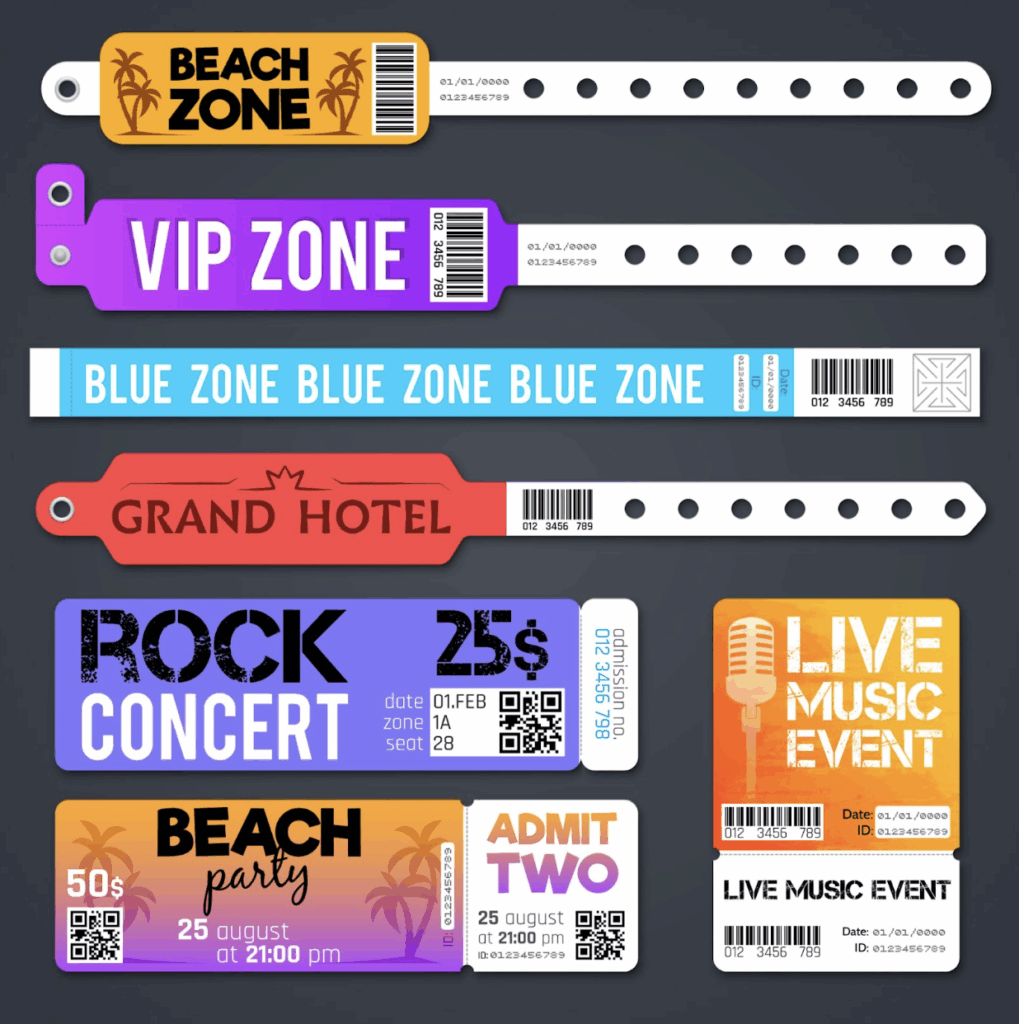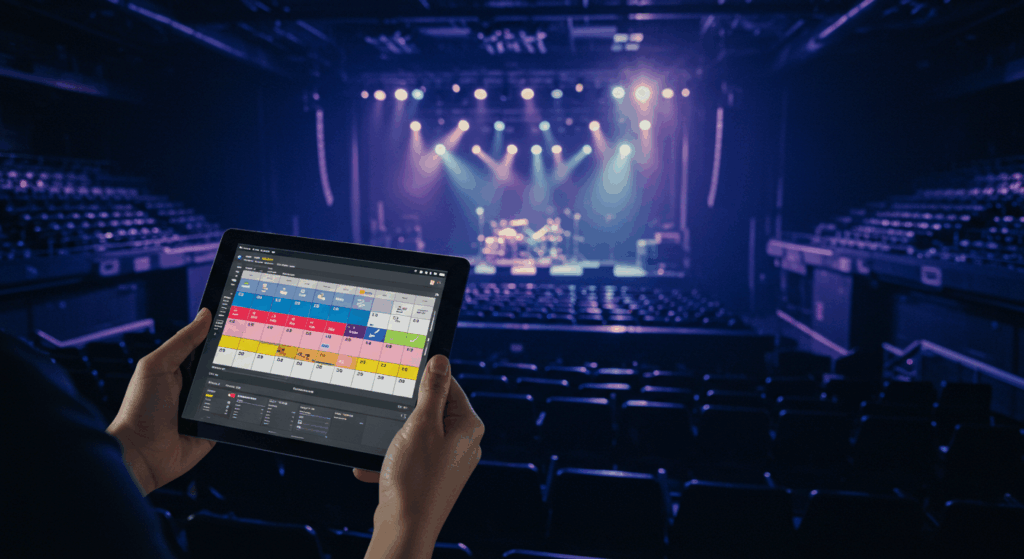
How to Master Concert Scheduling and Planning
Concert scheduling mastery requires effective calendar management, technical coordination, team communication, and mobile accessibility.
- Centralized scheduling systems prevent double bookings and streamline multi-venue coordination
- Technical rider integration ensures proper load-in windows, sound checks, and production requirements
- Real-time communication keeps artists, crews, and venue teams synchronized
- Mobile-first scheduling tools enable on-the-go management for live music professionals
The live music industry generated over $29 billion globally in 2024, yet venue operators are struggling with unprecedented operational challenges that complicate concert scheduling. While major promoters report record revenues, grassroots venues face thin margins where scheduling mistakes can spell disaster.
Concert scheduling planning differs from general event management. You’re coordinating technical riders, managing load-in windows, and synchronizing multiple teams across different time zones. The stakes are higher, the timelines tighter, and the margin for error essentially nonexistent. Modern venue managers need comprehensive scheduling solutions built specifically for the live music industry.
How Does Concert Scheduling Planning Differ from Regular Events?
Concert scheduling operates in a league of its own. Regular events involve booking a space and showing up. Concerts require orchestrating complex production schedules, managing artist touring logistics, and coordinating technical requirements that can make or break a show.
Talent costs now account for 75% to 85% of total ticket sales revenue, making every scheduling decision a financial calculation. Miss a critical deadline, and you could potentially lose tens of thousands of dollars.
Technical requirements add another layer of complexity. A corporate event might need basic AV equipment. Concerts demand specific power loads, rigging points, and acoustic considerations that must be verified months in advance. Your scheduling system needs to account for these technical variables, not just available dates.
Touring schedules create additional constraints that don’t exist in other industries. Artists book routes based on geography, routing efficiency, and market demand. Your venue might be perfect for a show, but if it doesn’t fit the tour’s logical progression, you won’t get the booking.
How Do You Build a Strong Scheduling Foundation?
Successful concert scheduling planning starts with robust calendar systems that go beyond basic date tracking. Your foundation needs to simultaneously handle holds, routing logistics, and multi-venue coordination.
Color-coded calendar views are ideal when managing multiple performance spaces. Red for confirmed shows, yellow for holds, and blue for load-in periods creates visual clarity that prevents the communication breakdowns that plague venues using generic event calendar software.
Hold management requires particular attention in concert scheduling. Unlike corporate events, where holds last days or weeks, concert holds can extend for months while agents work through routing details. Your system needs to track hold expiration dates, automatic follow-up triggers, and conversion rates to maintain healthy pipeline management.
Artist requirement tracking separates professional venue management from amateur hour. Technical riders, hospitality needs, security requirements, and dressing room specifications all impact scheduling decisions. When a rock band’s production requires a three-day load-in, your calendar needs to reflect that reality, not just the performance date.
Team coordination becomes increasingly complex as event scale grows. Your scheduling system needs to communicate with booking agents, tour managers, local promoters, and venue staff. Communication breakdowns cost businesses over a trillion dollars annually, making integrated communication a must-have feature.
What Concert Scheduling Tools Do You Need?
The right concert planning software can transform chaotic scheduling processes into smooth operations. These seven tools form the backbone of professional venue management:
Calendar Management Platforms serve as your central nervous system. Look for solutions offering drag-and-drop scheduling, automatic conflict detection, and multi-venue views. Music industry platforms offer features such as technical rider integration and touring logistics support that basic calendar applications often lack.
Artist Database Systems maintains critical information about touring acts, including historical performance data, technical requirements, and contact information. This data proves invaluable when agents call with routing opportunities that need immediate responses.
Technical Requirement Trackers integrate rider information with scheduling decisions. When a venue books a show requiring specific power loads or rigging points, your calendar should automatically reflect the extended setup time.
Financial Integration Tools connect scheduling decisions with revenue projections and settlement tracking. Seeing the financial picture of scheduling choices helps optimize your venue.
Communication Hubs centralize correspondence with agents, artists, and crew members. Email chains become unwieldy when managing complex touring schedules, but integrated messaging keeps everyone informed without information silos.
Mobile Applications enable scheduling management from anywhere. Venue managers can’t be tied to desk computers when they’re constantly moving between offices, stages, and meetings with artists.
Reporting and Analytics Dashboards provide insights into scheduling patterns, venue utilization rates, and revenue optimization opportunities. Data-driven scheduling decisions consistently outperform gut instincts.
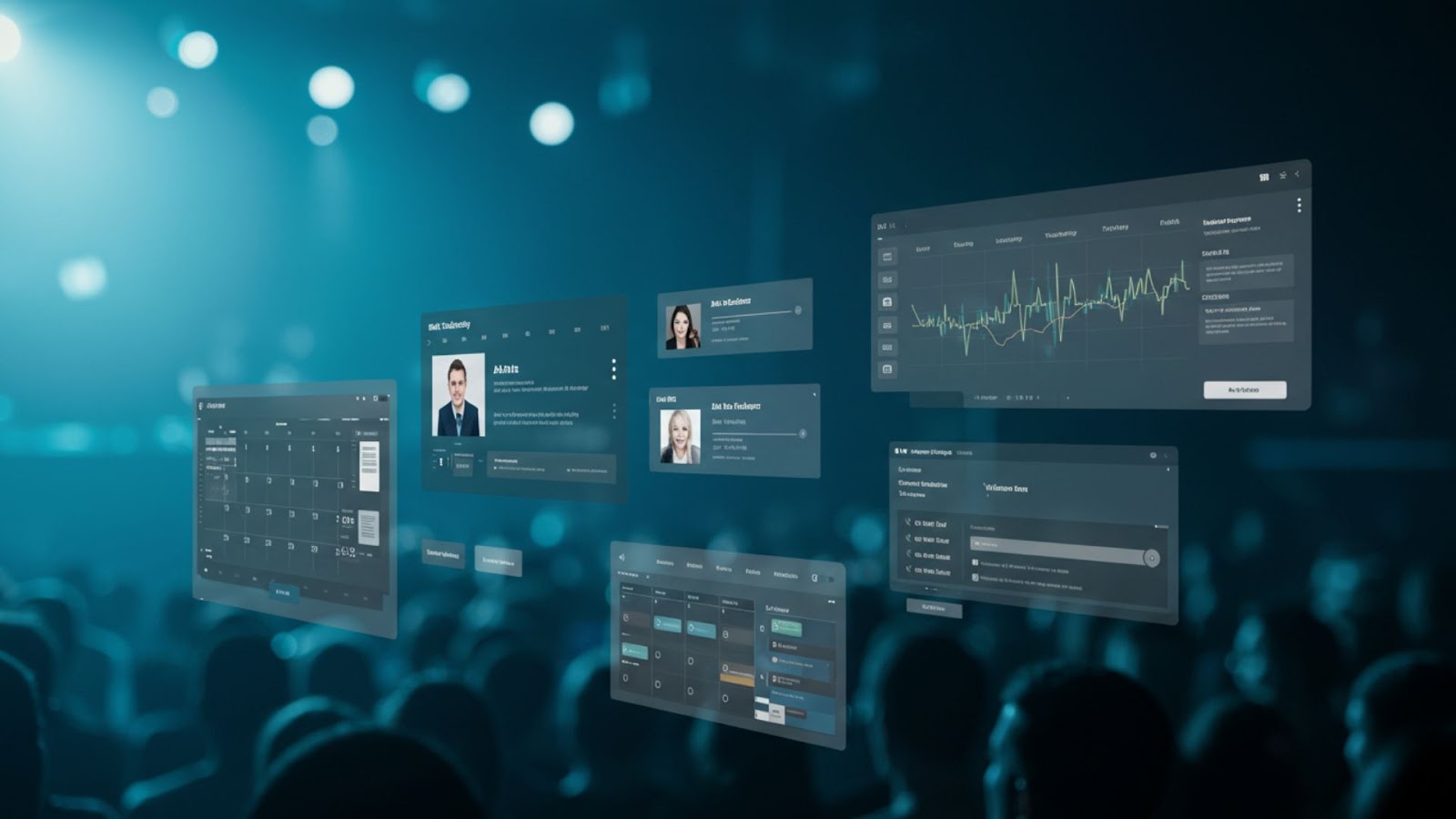
What’s the Step-by-Step Concert Scheduling Process?
Professional concert scheduling planning follows four phases that minimize conflicts while maximizing venue utilization and revenue potential.
Phase 1: Initial Booking and Holds
Start with a comprehensive availability assessment. Check performance dates, load-in requirements, competing local events, and artist routing logistics. Many venues lose bookings because they only consider the show date without taking into account production schedules.
Place strategic holds that protect your interests while maintaining agent relationships. Hold periods should reflect your venue’s booking patterns. Smaller rooms might hold for two weeks, while major venues could justify month-long holds for significant tours.
Document all hold terms clearly, including automatic expiration dates and conversion requirements. Miscommunications during hold periods can damage long-term relationships and result in lost bookings.
Phase 2: Confirmation and Technical Coordination
Your live show scheduling system should immediately flag potential conflicts between artist requirements and venue capabilities. Finding out on load-in day that power requirements exceed venue capacity creates expensive problems.
Coordinate production schedules with local crew members. Union halls have specific call times and overtime provisions that affect scheduling. Factor these labor considerations into your timeline from the beginning.
Establish communication protocols with tour management. Define who receives what information and when, preventing miscommunications that can derail otherwise well-planned events.
Phase 3: Pre-Event Scheduling Refinement
Update running orders as they develop. Initial time estimates rarely match final schedules, and your system needs flexibility to accommodate changes without creating conflicts with subsequent bookings.
Coordinate with local services, including catering, security, and transportation. These vendors need advance notice for proper staffing and resource allocation.
Finalize load-out schedules and venue reset timelines. The next day’s activities depend on efficient venue restoration, making load-out timing critical for maintaining schedules.
Phase 4: Execution and Post-Event Analysis
Monitor real-time schedule adherence during events. When shows run late, subsequent bookings may be affected. Having contingency plans ready prevents small delays from becoming major disruptions.
Document actual versus projected timelines for future reference. This data improves scheduling accuracy for similar events and helps identify patterns that could improve future bookings.
Conduct post-event debriefs with all stakeholders. Schedule-related issues often reveal system improvements that prevent future problems.
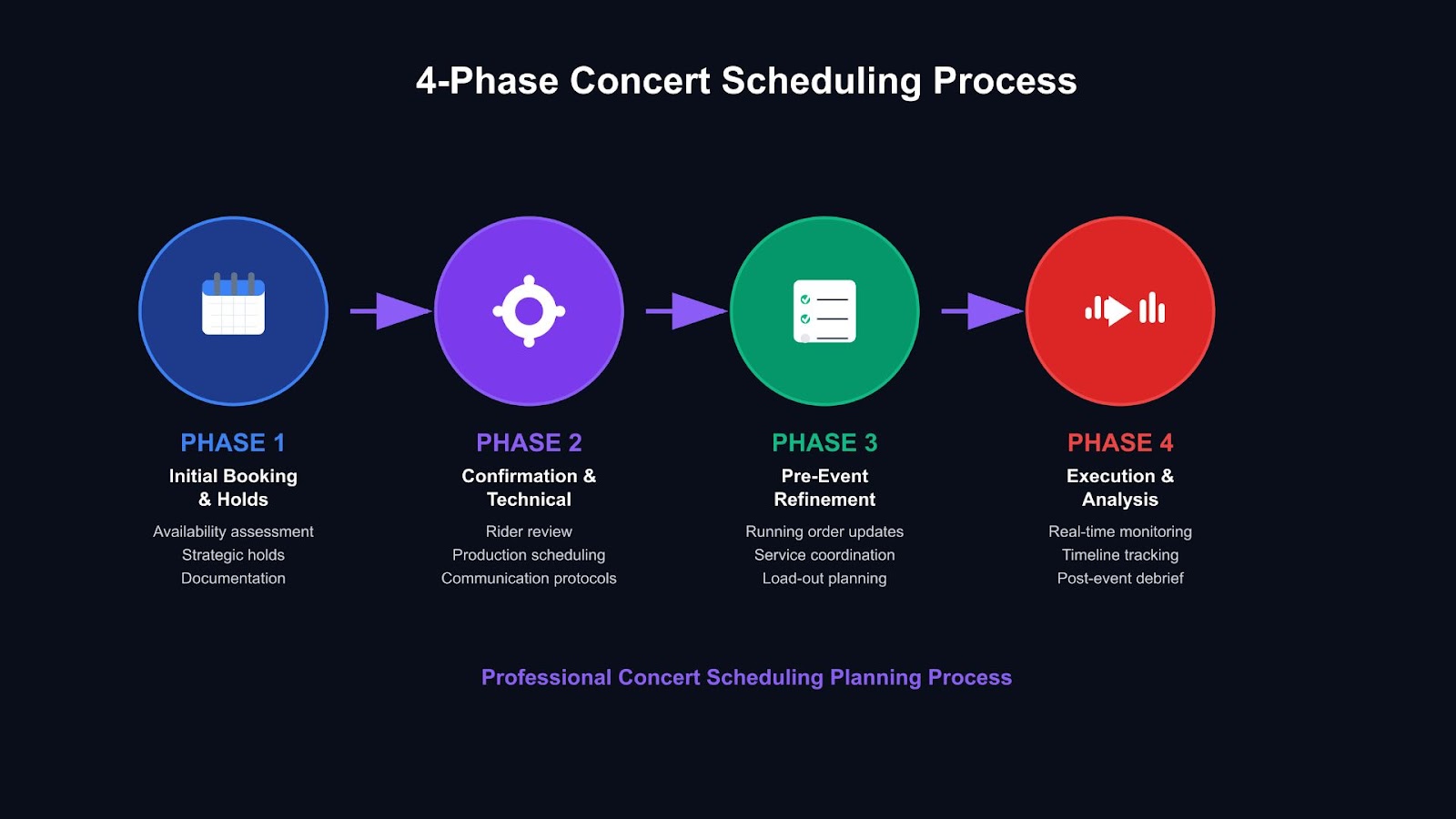
How Do You Avoid Common Scheduling Pitfalls?
Even experienced venue managers fall into predictable concert scheduling planning traps that can damage relationships and profitability.
Double booking remains the cardinal sin of venue management. It seems obvious, but it happens frequently when venues use multiple systems or fail to communicate holds properly. Color-coded calendar systems with automatic conflict detection eliminate most double-booking risks.
Communication breakdowns between teams create more subtle but equally damaging problems. When technical requirements change after initial booking confirmation, all affected parties need immediate notification. Delayed communication leads to last-minute scrambles that increase costs and stress levels.
Technical mismatches between artist riders and venue capabilities cause expensive surprises. Venues sometimes accept bookings, hoping to resolve technical shortfalls later, but this approach usually fails. Being honest during initial discussions prevents bigger problems down the road.
Load-in window miscalculations affect more than just the current show. Underestimating setup time can delay subsequent bookings, creating domino effects that impact multiple events. Buffer time between bookings provides insurance against these scheduling cascades. Professional live show scheduling systems account for these variables, preventing manual calculation errors that plague venues using basic calendar tools.
Financial oversight in scheduling decisions can make profitable events lose money. When venues book shows without considering full cost implications, including labor, utilities, and settlement terms, they often discover profit margins evaporating after the fact.
What Are the Best Multi-Venue Scheduling Strategies?
Managing complex touring schedules across multiple venues requires sophisticated coordination. Professional concert planning software becomes essential when dealing with multi-venue operations.
Geographic routing helps maximize touring efficiency for artists while increasing booking opportunities for venues. Understanding how tours move between markets allows venue managers to propose routing alternatives that benefit everyone involved.
Resource sharing between venues can reduce costs and improve operational efficiency. When multiple venues coordinate load-in equipment, staging, and crew resources, everyone benefits. Professional event calendar software becomes essential for tracking these shared resources across different locations and time zones.
Coordinated marketing campaigns across multi-venue tours create promotional synergies that benefit individual venues and overall tour success. Joint marketing efforts often achieve better results than isolated venue promotion.

How Do You Master Mobile Scheduling?
Modern venue management requires mobile accessibility. Venue managers frequently work between offices, stages, and meetings with artists, making mobile functionality essential.
Cloud-based scheduling systems provide real-time access to calendar information from any device. This capability proves essential when agents call with routing opportunities that require immediate responses. Music-first platforms excel at managing the intricate requirements of touring coordination that general business tools struggle to handle.
Push notification systems alert managers to schedule changes, hold expirations, and other time-sensitive issues. Automated alerts prevent oversight issues that can damage venue relationships with agents and artists.
Offline functionality ensures scheduling access even in areas with poor connectivity. Venue managers often work in locations with limited internet access, making offline capability a practical necessity.
Integration with mobile communication platforms streamlines coordination. When scheduling updates automatically trigger text messages or app notifications, everyone stays informed without manual communication efforts.

Frequently Asked Questions
What’s the biggest difference between event calendar software and concert-specific scheduling tools? Concert scheduling requires technical rider integration, load-in window management, and touring logistics coordination that generic event software can’t handle. Music-specific tools understand industry workflows and terminology.
How do I prevent double bookings when managing multiple venues? Centralized calendar systems with automatic conflict detection and color-coded hold tracking eliminate most double-booking risks. Never rely on separate systems for different venues; integration is essential.
What technical requirements most commonly affect concert scheduling? Power loads, rigging points, load-in door dimensions, and acoustic considerations most frequently impact scheduling decisions. Document these venue specifications clearly, and verify artist requirements early in the booking process.
Should concert planning software integrate with ticketing platforms? Absolutely. Real-time sales data integration allows for dynamic scheduling and improved financial tracking. When your scheduling system connects with ticketing data, you gain valuable insights for future booking decisions.
Transform Your Concert Scheduling Today
The live music industry demands scheduling systems that match its complexity and pace. Traditional approaches using spreadsheets and email chains create vulnerabilities that venues can’t afford. The venues thriving today are invested in proper scheduling systems, prioritize stakeholder communication, and embrace technology that streamlines operations.
Revolutionize your concert scheduling planning, and stop letting outdated systems limit your venue’s potential. Get started with Prism and discover how professional-grade scheduling tools can transform your operations, increase bookings, and boost profitability while reducing the stress that comes with managing complex live music events.

Matt Ford is the founder and CEO of Prism.fm, an Austin-based software company revolutionizing live music event management. With a background in entrepreneurship and a degree from the University of Wisconsin-Madison School of Business, Ford combined his self-taught coding skills with firsthand experience as a concert promoter to address the inefficiencies he observed in the industry. In 2018, he launched Prism.fm, an all-in-one platform designed to streamline operations for venues, promoters, and agencies by replacing cumbersome spreadsheets with integrated tools for booking, financial tracking, and contract management. Under his leadership, Prism.fm has grown significantly, achieving $3 million in annual recurring revenue post-COVID and securing over $15 million in funding . Ford’s commitment to building user-centric solutions has positioned Prism.fm as a trusted partner for over 1,500 venues and promoters worldwide.

